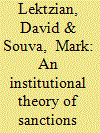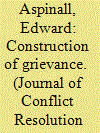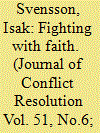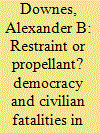|
|
|
Sort Order |
|
|
|
Items / Page
|
|
|
|
|
|
|
| Srl | Item |
| 1 |
ID:
079920


|
|
|
|
|
| Publication |
2007.
|
| Summary/Abstract |
Why do economic sanctions sometimes succeed, but often fail, to produce a policy change? The authors argue that the effect of economic punishment is conditional on a state's political institutions. In all cases, the key to sanctions success is to generate political costs for the target regime's winning coalition. However, because of different institutional incentives, economically punishing sanctions are less likely to succeed against a nondemocratic target than against a democratic target. Sanctions increase rents. This benefits nondemocratic leaders more than democratic ones. Also, nondemocratic leaders have smaller winning coalitions, so their core constituents suffer less from sanctions than democratic leaders. Additionally, the authors' strategic argument leads to novel hypotheses regarding the initiation of sanctions. They test hypotheses from their political cost argument against all dyadic sanctions cases between 1948 and 1990, using two different dependent variables and a censored selection estimator to take into account the strategic nature of sanctioning
|
|
|
|
|
|
|
|
|
|
|
|
|
|
|
|
| 2 |
ID:
079924


|
|
|
|
|
| Publication |
2007.
|
| Summary/Abstract |
This article makes a case for extending social constructivist approaches to the study of grievance in natural resource conflicts. It does this by analyzing the separatist conflict in Aceh, Indonesia, which is often portrayed as a paradigmatic resource conflict due to the importance of the natural gas industry there. It is argued here, however, that natural resource exploitation promoted conflict in Aceh only because it became entangled in wider processes of identity construction and was reinterpreted back to the population by ethnic political entrepreneurs in a way that legitimated violence. Rather than any intrinsic qualities of natural resource extraction, the key factor was the presence of an appropriate identity-based collective action frame. The argument is strengthened by comparison with two other resource-rich Indonesian provinces where resource extraction patterns were similar to Aceh but where no protracted violence occurred because similar identity resources were not available to local actors
|
|
|
|
|
|
|
|
|
|
|
|
|
|
|
|
| 3 |
ID:
079923


|
|
|
|
|
| Publication |
2007.
|
| Summary/Abstract |
A growing literature has started to explore the relationship between religious dimensions and the escalation, duration, and termination of armed conflicts. This study explores the conditions for negotiated settlements. The author argues that if the belligerents' demands are explicitly anchored in a religious tradition, they will come to perceive the conflicting issues as indivisible, and the conflict will be less likely to be settled through negotiations. Utilizing unique data on the primary parties' religious demands and identities, all intrastate conflict-dyads in the Uppsala Conflict Data Program (UCDP), 1989-2003, are examined. The study finds that if governments or rebel-groups have made explicit religious claims, these conflict-dyads are significantly less likely than others to be terminated through negotiated settlement. By contrast, whether the primary parties come from different religious traditions does not affect the chances for negotiated settlement
|
|
|
|
|
|
|
|
|
|
|
|
|
|
|
|
| 4 |
ID:
079922


|
|
|
|
|
| Publication |
2007.
|
| Summary/Abstract |
Studies of cultural differentiation have shown that social mechanisms that normally lead to cultural convergence-homophily and influence-can also explain how distinct cultural groups can form. However, this emergent cultural diversity has proven to be unstable in the face of cultural drift-small errors or innovations that allow cultures to change from within. The authors develop a model of cultural differentiation that combines the traditional mechanisms of homophily and influence with a third mechanism of network homophily, in which network structure co-evolves with cultural interaction. Results show that in certain regions of the parameter space, these co-evolutionary dynamics can lead to patterns of cultural diversity that are stable in the presence of cultural drift. The authors address the implications of these findings for understanding the stability of cultural diversity in the face of increasing technological trends toward globalization.
|
|
|
|
|
|
|
|
|
|
|
|
|
|
|
|
| 5 |
ID:
079919


|
|
|
|
|
| Publication |
2007.
|
| Summary/Abstract |
Discussions of world hunger have focused on economic growth and international food aid, assuming that food supply is the critical issue. The authors show that food access rooted in social stratification and military power is the central problem. Synthesizing the entitlement and military famine approaches to hunger, the authors examine the effects of food supply, economic growth, social stratification, and military power on child hunger in less developed countries (1990-2000) using a cross-national analysis. Child hunger is largely due to gender stratification, militarization, and armed conflict. Halting wars, expanding political rights, and improving gender equity reduce child hunger. Economic growth and programmatic international food aid reduce child hunger, but there are no benefits from increased total food supply or international emergency relief. Child hunger is an access problem best addressed by expanding social and political rights, reducing armed conflict and militarization, and improving women's status. Early warning and relief efforts should focus on these concerns instead of the ``supply'' concerns traditionally emphasized
|
|
|
|
|
|
|
|
|
|
|
|
|
|
|
|
| 6 |
ID:
079921


|
|
|
|
|
| Publication |
2007.
|
| Summary/Abstract |
This article investigates the effect of regime type on the number of civilian fatalities that states inflicted in interstate wars between 1900 and 2003. As opposed to several previous studies, the author finds little support for normative arguments positing that democracies kill fewer civilians in war. In fact, the author finds that democracies are significantly more likely than nondemocracies to kill more than fifty thousand noncombatants. Democracies also kill more civilians when they are involved in wars of attrition and kill about as many (and perhaps more) noncombatants than autocracies in such wars. These findings provide qualified support for institutional arguments about democratic accountability. Other implications of the institutional view, however, are not upheld, such as the argument that democracies select easy wars that should result in few civilian casualties because they are won quickly and decisively. Finally, democracies do not appear to kill fewer civilians in more recent wars
|
|
|
|
|
|
|
|
|
|
|
|
|
|
|
|
|
|
|
|
|